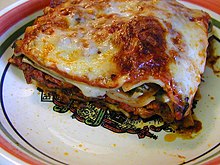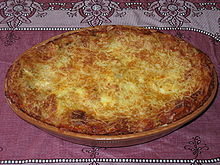Lasagna

Lasagna (singular, pronounced /la'zaɲa/), also lasagne (plural, pronounced /la'zaɲe/), is both a form of pasta in sheets (sometimes rippled, though seldom so in Italy) and also a dish, sometimes named lasagne al forno (meaning "oven-cooked lasagne") made with alternate layers of pasta, cheese, and often ragù (a meat sauce) or tomato sauce.
The word lasagna or lasagne (plural), which originally applied to a cooking pot, now simply describes the food itself.[1] Most English-speaking people follow the Italian usage and use the plural "lasagne" to refer to both the dish and the pasta, but Americans commonly use the singular "lasagna". For example, "Weird Al" Yankovic (an American singer and songwriter) used this spelling for his song "Lasagna", which is as a parody of "La Bamba".
Notable fans of lasagne include Julian Casablancas of The Strokes, who has stated that lasagne is his "perfect meal".[2] Oasis also mentions lasagne in the song "Digsy's Dinner", from their debut album Definitely Maybe.[3]
Variants

Various recipes call for several kinds of cheese, most often ricotta and mozzarella. The classic Lasagne alla Bolognese uses only Parmigiano Reggiano. Many recipes also add béchamel sauce (besciamella).
A variant is Lasagne verde (green lasagne) which is the normal egg pasta with spinach added. Other variations include vegetarian or seafood versions of the dish. This concept is acknowledged by the writers of the Seinfeld episode called "The Butter Shave", in which "Vegetable Lasagna" was the nickname given by Elaine Benes to the airline passenger next to her.
Łazanki is a similar dish made in eastern Europe.
Origin

The dish is believed to have originated in Italy.[4] The word "lasagna" is derived from the Greek word λάσανα (lasana) or λάσανον (lasanon) meaning "trivet or stand for a pot", "chamber pot".[5][6][7] The word was later borrowed by the Romans as "lasanum" to mean cooking pot. The Italians then used the word to refer to the dish in which what is now known as lasagne is made. Another theory suggests that lasagna might have come from Greek λάγανον (laganon), a kind of flat sheet of pasta dough cut into stripes.[8][9][10][11]
The recipe was featured in the first cookbook ever written in England, leading to an urban legend that the dish originated in the British Isles.[4] The claim is dubious, due to the much earlier Roman use of "lasanum", and the Italian embassy in London particularly speaks out against such theories.[4]
Because of its perceived Italian association, lasagne is the favourite food of fictional Italian characters such as Mario (as stated in The Adventures of Super Mario Bros. 3) and Joey Tribbiani from Friends (who is of Italian descent). Lasagne is also favored by other fictional characters, perhaps most famously the cartoon cat Garfield. Another example is in the movie Clerks, when Dante's decision to stay with his girlfriend is swayed by the fact that she brings him lasagne at work.
External links
References
- ^ ""Lasagna: Food Facts & Trivia"". Foodreference.com. Retrieved 2007-05-04.
- ^ answer to "What is your perfect meal?" question, "Extras". Ask Me Anything. The Strokes. Retrieved 2008-01-29.
- ^ "Oasis lyrics - Digsys Dinner". lyricscrawler.com. Roy Russo. Retrieved 2008-01-29.
- ^ a b c
Emory, David (July 15 2003). ""Stop the Presses, Lasagna is British!"". About.com. Retrieved 2007-04-23.
{{cite web}}: Check date values in:|date=(help) Cite error: The named reference "Lasagna British" was defined multiple times with different content (see the help page). - ^ Lasana, Liddell and Scott, "A Greek-English Lexicon", at Perseus
- ^
Muhlke, Christine (1997-04-02). "A Lighthearted Look at How Foods Got Their Names". Cookbook Shelf: Book Review. Salon.com. Retrieved 2007-09-30.
{{cite web}}: Check date values in:|date=(help) - ^ "lasagna". Merriam-Webster's Online Dictionary. Encyclopædia Britannica Online. Retrieved 2007-09-30.
- ^ Laganon, Liddell and Scott, "A Greek-English Lexicon", at Perseus
- ^ "Food in the Ancient World from A to Z", Andrew Dalby, Routledge, 2003
- ^ "Everyone Eats: Understanding Food and Culture", Eugene Newton Anderson, NYU Press, 2005
- ^ The Real Italian Pasta
